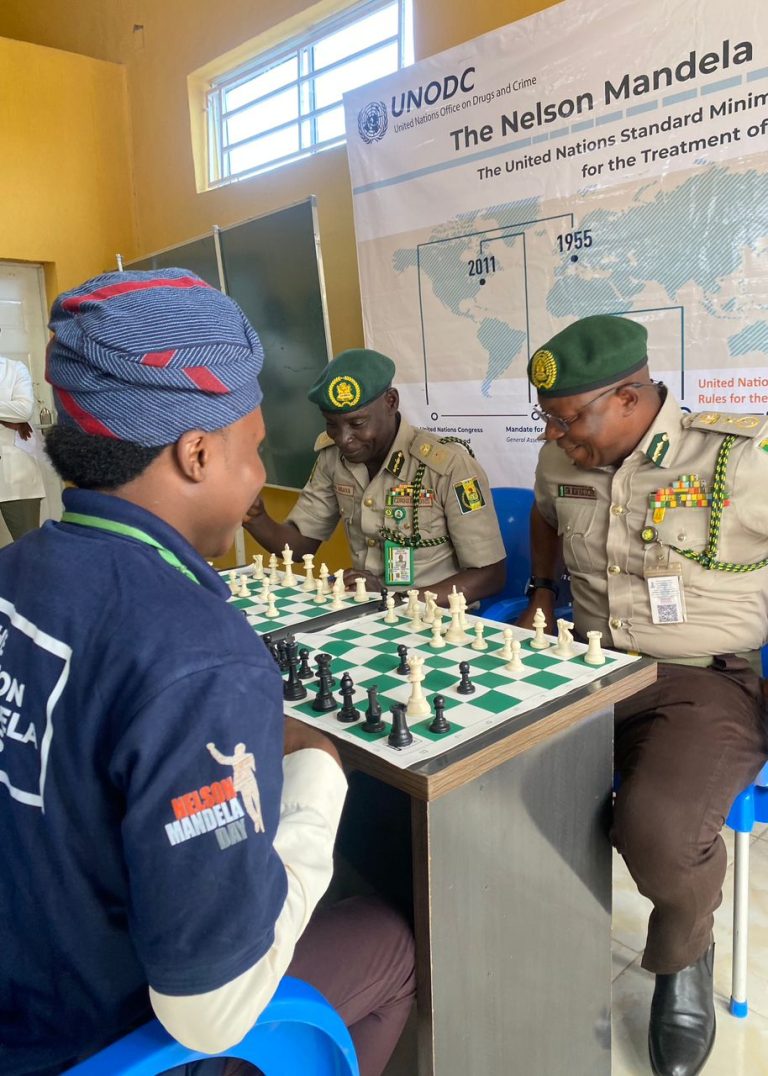By Ibironke Ariyo
The United Nations Office on Drugs and Crime (UNODC), the Nigerian Correctional Service (NCoS) and Chess in Slums Africa have revealed the game of transformative chess at maximum and medium security detention centers in Maiduguri, Borno.
Speaking at the inauguration, Danilo Campisi, UNODC Deputy Representative in Nigeria, said the innovative initiative aims to combat the stigma associated with imprisonment.
He said, this would be done by highlighting the potential for growth and change within prisoners.
The News Agency of Nigeria (NAN) reports that the inauguration took place to commemorate the 2024 Nelson Mandela International Day.
Campisi said the program aims to reduce recidivism rates and contribute to safer communities by focusing on rehabilitation and skills development.
“Through this program, inmates can participate in meaningful activities that stimulate their minds and promote a sense of accomplishment and self-esteem.
“Nelson Mandela believed in the potential for change in every individual and failures can fuel that change,” he said.
Speaking about the importance of the initiative, Campisi said: “Chess, with its intellectual rigor and strategic thinking, can equip prisoners with essential life skills, improve their mental health and provide a constructive outlet for their energy.
He said that although prisoners may have made poor choices in life, it is crucial that we support them and provide them with the skills they need for their rehabilitation and reintegration into society.
“UNODC is excited about this initiative and the partnership with NCoS and Chess in Slums Africa.
“Through this program, we hope to see the next chess champions emerge from the detention center.
“UNODC, NCoS and Chess in Slums Africa invite you to support this initiative and follow the journey of detainees as they learn, grow and transform through the game of chess.”
Campisi commended the US Bureau of International Narcotics and Law Enforcement Affairs (INL) for funding the initiative, as well as the German Federal Government (2021-2023) for its work on prison and criminal reform in Nigeria.
Earlier, the Borno State NCoS Prison Controller, Abdullahi Mbaya, had emphasized that UNODC support with INL funding would help the correctional service achieve a lot.
Mbaya said this would also help showcase the remarkable talents and skills of inmates at the Borno Correctional Centre.
“This intervention will help the Corrections Service fulfill its mandate in terms of prisoner rehabilitation.
“It will also allow the public to see the potential of inmates, inspiring hope for their future beyond the walls of correctional centers,” he said.
Furthermore, Tunde Onakoya, founder of Chess in Slums Africa, shared his vision, saying: “We have seen first-hand how chess can transform lives in the most challenging environments.
“Bringing chess to detention centers is a natural extension of our mission to use the game as a tool for social change.
“We are honored to partner with UNODC to make this a reality,” he said.
Inmates expressed enthusiasm for the program, saying that learning chess would provide them with a mental escape and a new way of approaching problem solving.
One of the prisoners who participated in the pilot phase said: “Failure teaches us to think before we act, to plan in advance. These are lessons that go beyond the game.”
NAN reports that the initiative was inaugurated following the inauguration and handover of a newly constructed and equipped clinic and a furnished showroom constructed to display products made by inmates of the two correctional centers in Borno State.
UNODC also donated sports equipment and clothing to six detention centers in northeastern Nigeria, including the Maiduguri maximum and medium security detention centers in Borno, with the aim of promoting sport in these facilities.



